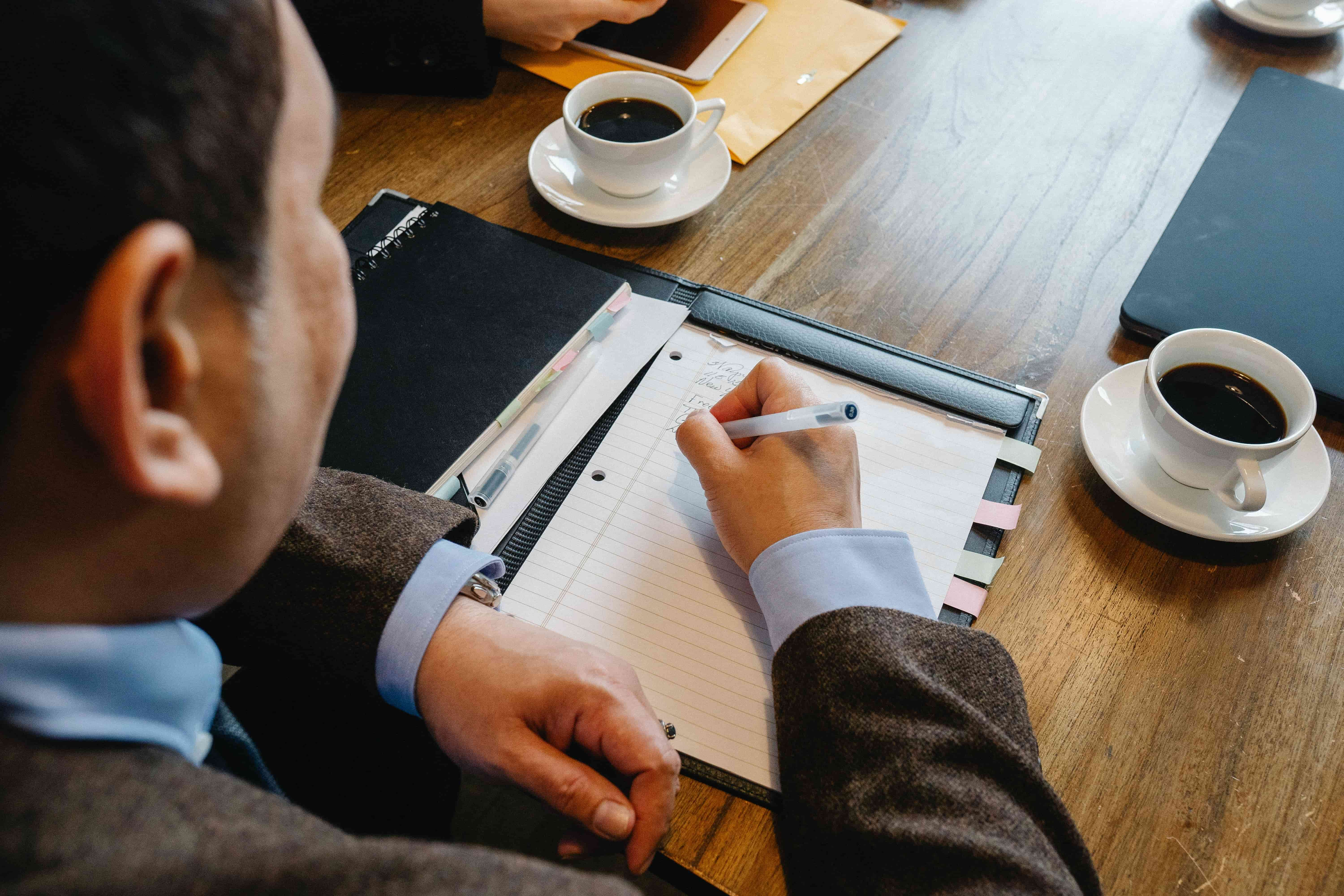Mastering Effective Note Taking at Meetings: Improve Your Productivity and Retention
 By
Team Taju Coaching
·
3 minute read
By
Team Taju Coaching
·
3 minute read

Note taking at meetings is a skill that can significantly enhance productivity and retention. By effectively capturing key information and action items, you can ensure that nothing falls through the cracks and stay on top of your work.
In this article, we will explore some practical techniques to help you master the art of note taking, enabling you to make the most out of every meeting you attend.
The importance of effective note taking at meetings
Effective note taking at meetings is a fundamental aspect of productive collaboration. It allows attendees to capture key information, ideas, and action items, ensuring that nothing gets overlooked. By documenting discussions, decisions, and responsibilities, meeting notes serve as a valuable reference point for future discussions and accountability. Taking thorough and organized notes enables participants to recall important details, track progress, and follow up on commitments.
Additionally, it promotes active listening, engagement, and participation during meetings. Without effective note taking, important insights and agreements may be lost, hindering the overall effectiveness of the meeting and subsequent actions.
Benefits of Effective Note Taking
Benefits of Effective Note Taking at Meetings
Effective note taking during meetings can significantly enhance productivity and improve overall outcomes. By capturing and organizing key information, participants can better retain important details and track progress. Furthermore, note taking enables participants to refer back to previous discussions, ensuring that action items and decisions are not overlooked. For instance, noting specific deadlines or assigning responsibilities to individuals can help prevent misunderstandings and promote accountability.
Additionally, effective note taking allows for better collaboration and information sharing among team members, fostering a more cohesive and efficient work environment.
Preparation for Effective Note Taking
When it comes to effective note-taking at meetings, adequate preparation sets the stage for success. By familiarizing yourself with the meeting's agenda and relevant background information beforehand, you can ensure that you are well-equipped to capture key points and action items.
For example, reviewing previous meeting minutes can provide valuable context and help you identify recurring topics or trends.
Additionally, bringing the necessary tools such as a reliable note-taking app or pen and paper ensures you are ready to capture information efficiently. By taking these preparatory steps, you can enhance your note-taking abilities and contribute more effectively to the meeting.
Utilizing Effective Note Taking Techniques
One of the most important aspects of successful meetings is effective note taking. Taking accurate and organized notes allows participants to capture important information and better retain it for future reference. By using note taking techniques such as using abbreviations, highlighting key points, and structuring notes in a logical format, attendees can ensure they capture the most relevant details without feeling overwhelmed.
For example, using symbols to represent common words or concepts can save time and enable faster note taking. Similarly, categorizing information under headings or using bullet points can enhance clarity and ease of review. Implementing these practical techniques can greatly improve the efficiency and usefulness of meeting notes.
Choosing the Right Note Taking Medium
When it comes to effective note taking at meetings, selecting the appropriate note-taking medium is crucial. The medium you choose should cater to your personal preferences and needs. For instance, some individuals may prefer taking handwritten notes in a notebook, as it allows for easy organization and annotation. Others may opt for digital note-taking tools for efficient searching and collaboration purposes.
It's important to consider factors such as accessibility, ease of use, and the ability to integrate with other productivity tools. Experimenting with different mediums can help determine the most suitable option for you.
Maximizing Note-Taking Skills during Meetings
Maximizing note-taking skills can significantly enhance the effectiveness of meetings. By capturing pertinent information, attendees can better retain and refer back to crucial details. For instance, jotting down action items helps ensure follow-up tasks are completed efficiently.
Additionally, recording key points discussed during brainstorming sessions enables team members to recall and build upon these ideas later on. Effective note-taking also aids in organizing thoughts and facilitates better collaboration among team members. By summarizing important discussions or decisions, individuals can refer back to these notes to stay on track and ensure alignment.
Reviewing and Applying Meeting Notes
Reviewing and applying meeting notes is a crucial step in effective note-taking. By revisiting the notes after a meeting, you ensure that important information is not overlooked or forgotten.
For example, reviewing meeting notes can help identify action items and follow-up tasks that need to be completed.
Additionally, it allows for the identification of key decisions and agreements made during the meeting. Applying the meeting notes involves taking relevant action based on the information gathered. This could include sharing important updates with team members, incorporating feedback received during the meeting, or using the notes as a reference for future discussions.
Over to you
This article discusses the importance of effective note taking during meetings and how it can improve productivity and retention. It emphasizes the need for clear and concise notes that capture key points and action items. The article provides actionable tips on how to master this skill, including strategies to stay focused, use shorthand techniques, and organize notes for easy reference.
It highlights the benefits of good note taking, such as enhanced understanding of discussed topics, increased engagement, and improved memory recall. By mastering effective note taking, individuals can enhance their productivity and retain valuable information from meetings.
